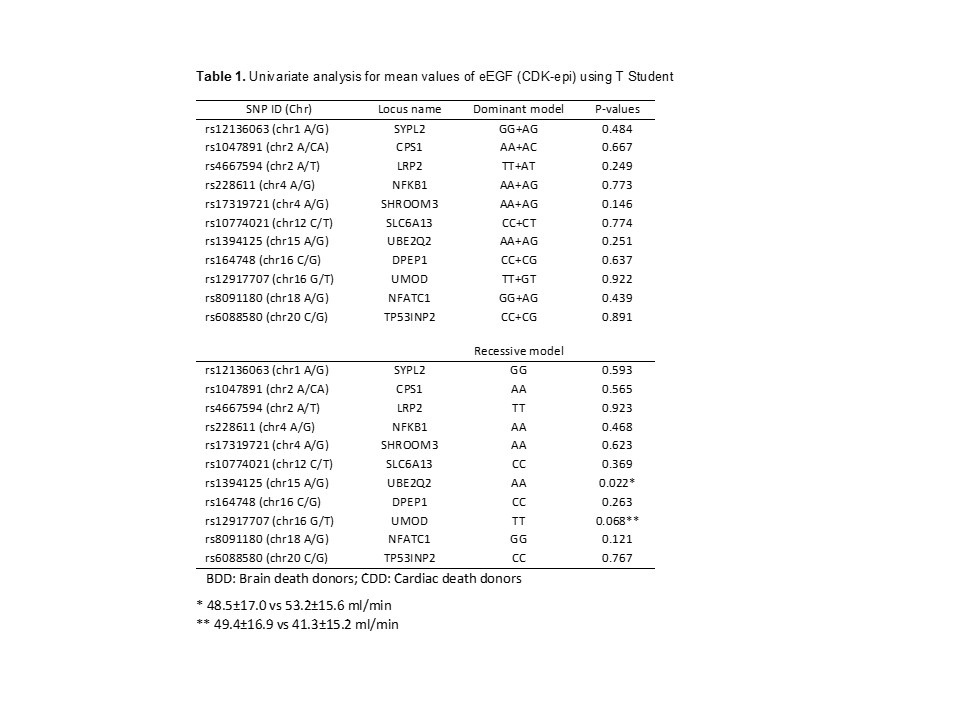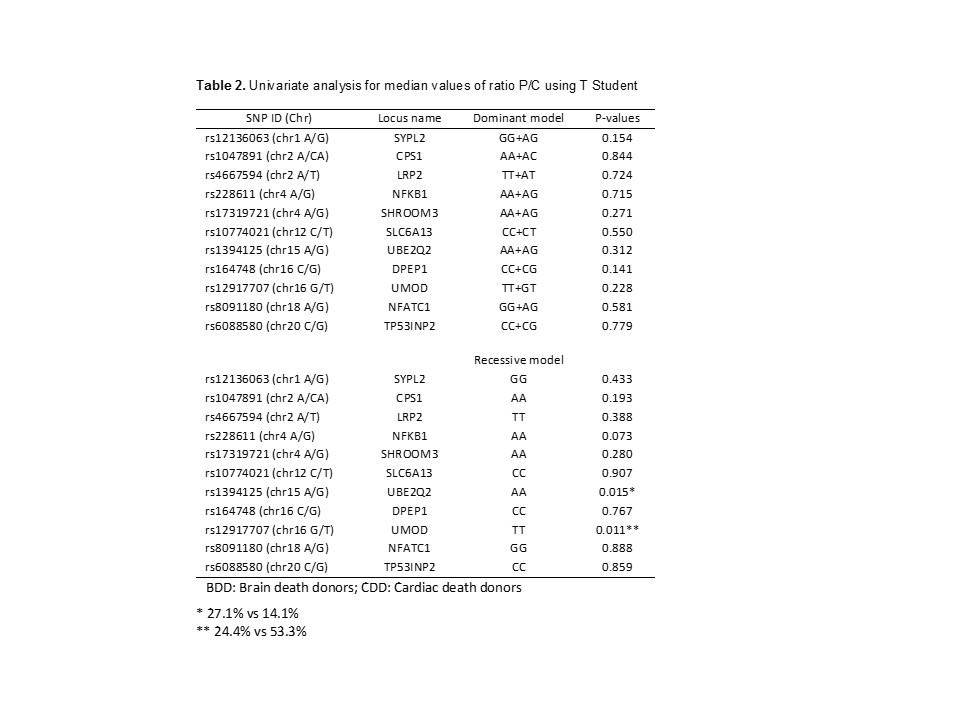Genetic Associations of Polymorphism Located at Loci Relevant for Kidney Function in a Cohort of Kidney Transplant Recipients.
Jose Luis Santiago1, Isabel Pérez-Flores 2, Luis Sánchez-Pérez 1, María Ángeles Moreno de la Higuera 2, Javier Querol-García 1, Natividad Calvo Romero 2, Miguel Fernández-Arquero 1, Elena Urcelay 1, Cristina Fernández-Pérez 3, Ana Isabel Sánchez-Fructuoso 2.
1Immunology Department, Hospital Clínico San Carlos, Instituto de Investigación Sanitaria San Carlos (IdISSC), Madrid, Spain; 2Nephrology Department, Hospital Clínico San Carlos, Facultad de Medicina, Universidad Complutense de Madrid, IdISSC, Madrid, Spain; 3Clinical Research and Methodology Unit , Hospital Clínico San Carlos, Facultad de Medicina, Universidad Complutense de Madrid, IdISSC, Madrid, Spain
Introduction: Although surgical techniques and immunosuppressive treatments have greatly advanced in kidney transplantation, the impact on long-term allograft survival has been limited. Nowadays, no biochemical or immunological markers exist with a high degree of predictive power to detect post-transplant complications. Obviously, earlier detection and identification of all predictive factors could help us to reach a better understanding of renal graft status and efficient implementation of noninvasive biomarkers should be used to monitor renal graft status and to establish personalized therapies for renal transplant patients. Our hypothesis was that genetic polymorphisms might predict the course of renal transplantation and become biomarkers transferable to clinical practice, for that purpose, we selected some polymorphisms located in loci relevant for kidney function identified in genome-wide association studies (GWAS) in patients with chronic kidney disease.
Materials and Methods: The group of SNPs were genotyped by iPLEX Gold assay based on a simple single-base primer extension and data analysis was performed on the Typer Software Module (Sequenom, Inc.).
Results and Discussion: We have studied a group of 11 SNPs selected from a published GWAS that were relevant for kidney function in no transplanted subjects. Our purpose was to analyze the effect of these polymorphisms in kidney transplant outcome by checking the kidney function using the estimated glomerular filtration rate (eGFR) values using the CKD-EPI equation and the urine protein/creatinine ratio (P/C). As expected, we found association in our transplanted patients with some polymorphism located in genes.
Ubiquitin conjugating enzyme E2 Q2 (UBE2Q2) is a member of the ubiquitin-conjugating enzyme family, involve in the ubiquitin-proteasome pathway. Related to transplanted patients the SNP previously associated in GWAS, it seems to be associated with eEGF (Table 1) and also with protein/creatinine ratio (Table 2) considering the recessive model and no association in case of dominant model.
The UMOD gene encodes for uromodulin, which is the most abundant protein in urine of healthy individuals and is transcribed exclusively in the thick ascending limb of the loop of Henle. The association of the UMOD risk variant with chronic kidney disease (CKD) was observed in the presence and absence of major known risk factors for CKD, including diabetes and hypertension. The minor T allele at rs12917707 was associated with 20% reduced risk of CKD. We found that this SNP was associated with eEGF and P/C ratio only in recessive model (Tables 1 and 2).
Conclusion: Polymorphism previously published in GWAS that were relevant for kidney function in no transplanted subjects, were also found associated in kidney transplant recipients and could be new biomarkers for these patients.


